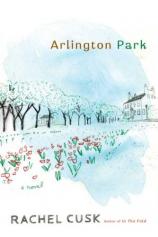Arlington Park
Review
Arlington Park
Rachel Cusk, a Whitbread Award winner, has written a number of
books about parenting and motherhood, including A LIFE'S WORK: On
Becoming a Mother, a serious and somewhat sad look at her changing
life. But ARLINGTON PARK is a stunner --- a depressing, sustained
bummer of a book that is written so poetically and with such
literary panache that it cannot be put down or ignored, no matter
how painful it is to read.
The females in this novel chase things outside of their daily
lives, whether they be second-rate careers, vestiges of lost
femininity, or God; not one woman is content with her situation.
Adding to their overall morose and introspective behavior is the
reality of pounding relentless rain that accompanies their every
task, from ill-fated coffee dates to lunch at a nearby mall or
dressing for dinner parties. As Amanda (the nervous nellie who
buries herself in housework), Juliet (the feminist thinker and
teacher), Solly (who feels her feminine spirit has been
diminished), Christine (funny but depressing) and Maisie (who is,
as the jacket copy records, "despairing at the inevitability with
which beauty is destroyed") move through this day, small and simple
details around them inspire great and swelling discourses --- inner
and outer --- about the harsh realities of the choices they've
made.
Hemmed in by the well-planned community in which they live, gazing
at the freedom of a place like London in the physical and emotional
distance, these women are good and stuck, suffocated, oppressed,
horribly unhappy. As Christine thinks later in the book, "She lived
in terror of her expulsion from the light. She lived in the front
of her brain until it hurt." Even cooking is filled with greater
meaning, with the symbols of an iconography that warrants great
caution in the staving off of psychological disaster.
In some ways, ARLINGTON PARK is laid out like a video game: there
are the players, and the obstacles they must move through in order
to get to the winner's circle. In this case, the obstacles are
mostly human: men who don't appreciate, understand or need the same
way that the women do, and children who are basically there to
remind each woman of her failures --- of being too well educated
and prepared for something else that has never come to fruition, of
being frightened of the clutchy, needy beings that their bodies
have created (Solly is even pregnant as the story unfolds). It's a
very dark and dismal place that they live in, their mental states
matching the natural distress that pushes at them with wind and
water. As far as the winner's circle is concerned, it's too far
away for any of them to find.
The unrelenting craziness of motherhood is a fantastic canvas for
Cusk's resonant poetry. Like MRS. DALLOWAY or ULYSSES (to use some
big-time classic literature for comparison), ARLINGTON PARK reaches
for a broad and expansive inner state that rages against the
confines of the outer one. It is a book that calls you to it with
your every cerebral impulse firing, requiring you to be fully
present when you're reading it.
But beware: even if you are a lover of great and challenging art,
the realities of these characters' lives will leave you more than a
bit unbent --- like watching yourself in a mirror for too long ---
but you will be glad you took the journey anyway. If only there was
some humor here, ARLINGTON PARK would be a perfect book.
Reviewed by Jana Siciliano on January 5, 2011
Arlington Park
- Publication Date: January 9, 2007
- Genres: Fiction
- Hardcover: 256 pages
- Publisher: Farrar, Straus and Giroux
- ISBN-10: 0374100802
- ISBN-13: 9780374100803





